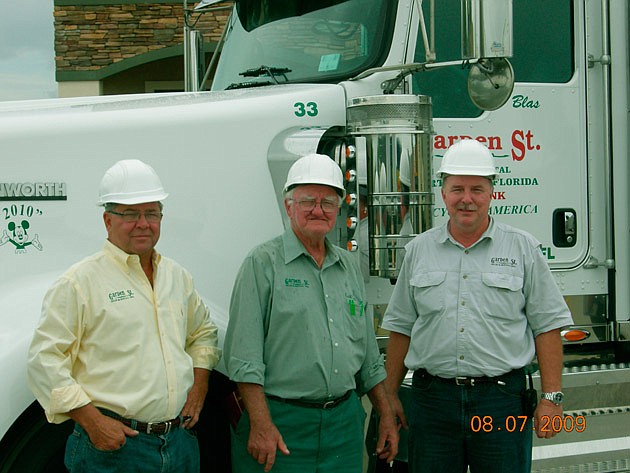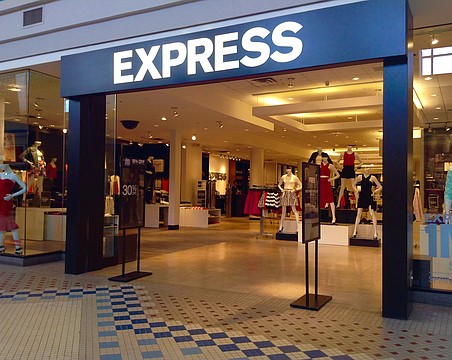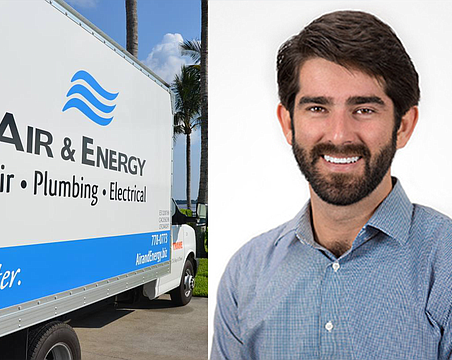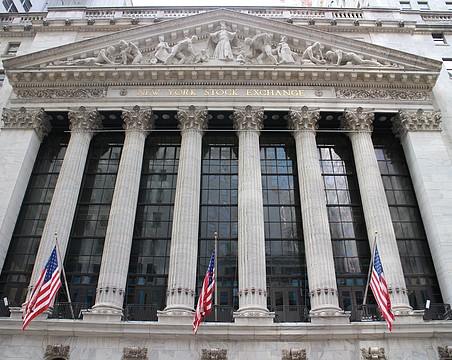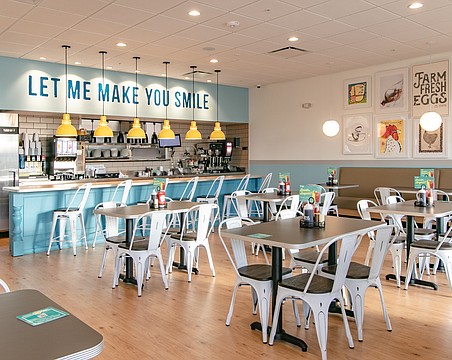The Weber family has always run its recycling business conservatively, paying cash for new equipment and never taking debt. It's paying off now.
Robert Weber swivels in his chair and peers out the second-story window of his office at Garden Street Iron & Metal Inc., a giant recycling plant in the gritty industrial part of Fort Myers.
A metal container is inching up a massive conveyor belt that feeds into a giant shredder. The shredder, in turn, promises to pulverize the huge container in just minutes. But by the looks of it, the container won't fit into the mouth of the shredding beast.
Weber, president of the family-owned business, jumps out of his chair, grabs his handheld radio and barks at the operator to reverse the conveyor belt. He orders a nearby crane operator to pluck the container away so the welders can cut it into smaller chunks.
Weber slumps back in his chair, shakes his head and rolls his eyes. If he hadn't been paying attention, the container might have gotten stuck at the top of the conveyor belt. That could have created a costly delay because Garden
Street has a deal with the local power company for favorable electric rates by running the giant shredder during off-peak hours.
Garden Street's success is largely due to Weber's vigilance. “I'm here every day, I work seven days a week, from 6 a.m. to 6 p.m.,” he explains. “We haven't had a bad year in the 20 years we've been open here.”
Weber's hands-on approach was on display after Hurricane Charley hit the Gulf Coast in 2004. He piloted his plane around the devastation, landed at local airfields and negotiated for his roving trucks to haul away the storm-twisted metal. Then, he'd take off and find another site before his competitors could get there.
Sure, revenues aren't growing as fast today because of the weak economy. While Weber won't disclose the firm's financial information, he says Garden Street doesn't owe anyone money and is profitable. “We have zero accounts payable,” he says.
It helps that Garden Street doesn't have the multiple layers of management that can slow a company down, Weber says.
Here's another secret to Garden Street's ongoing profitability: the company carries no debt. Weber calls the firm “Dutch conservative” and pays cash for everything, including its recent $17 million expansion. “In a year like 2009, that's key,” says Weber, 49.
Garden Street moved ahead with the expansion despite a less than rosy outlook. Weber is in a position to know. The metal that Garden Street recycles — steel, aluminum and copper, among others — ends up in industrial products around the globe. “This is a worldwide economic slump,” he says.
In his view, the government is prolonging the pain by bailing out failing industries like carmakers. That will ensure years of slow growth as failing businesses plod along on government life support. “Why should the taxpayers be on the hook?” he fumes. “They're not going to come bail me out.”
Metal in, cash out
Garden Street pays suppliers of scrap metal the day the shipments come in. Individuals who come with truckloads of appliances and other metal goods receive a coded receipt they can take to an automated teller on site that spits out the cash.
The company used to pay within 30 days but realized that it had to retain a full-time person to answer calls from scrap sellers inquiring about their money. Now, the money's paid right away, which gives Garden Street an advantage over slower-paying competitors. Vendors who bring scrap metal to Garden Street know they'll be paid immediately in cash or within days with a check in the mail.
The Weber family doesn't like to owe others anyhow. Family patriarch and chief executive officer Earl Weber, 79, built the business in Cincinnati over 50 years without borrowing. That's a testament to Weber's business acumen because a scrap yard is a capital-intensive business.
Even as the economy slowed last year, Garden Street's Fort Myers operation underwent its $17 million expansion, including a new $7 million monstrous machine that can gobble whole cars and spit them out into piles of separate kinds of metals. After the engines, batteries, fluids and axels are removed, it takes just minutes for a car to be digested that way.
With the new equipment, Garden Street's Fort Myers facility can grow the volume of recycled metal by 400% to 500%, though the recession means volume has grown by only about 120% over the past year. Revenues are off because the prices for steel dropped 50% and aluminum and copper are also down substantially from their highs in recent years.
Garden Street's Ohio facility, run by Robert Weber's older brother Earl Jr., 52, is about to undergo its own expansion. The two brothers kid each other about their relative performance. “It gives me an incentive,” Robert Weber chuckles.
The Webers are always seeking out new opportunities, especially now that they've increased capacity. For example, they've ventured into buying retired fleets of trailers that most recycling plants prefer not to handle. “To us, it was a little niche,” Robert Weber says. He's added staff to go out and find other sources of recycling materials and plans to modernize its paper facility.
Currently, Garden Street's biggest customers are in Asia. “Right now, the majority goes out of Port Everglades to Korea,” Weber says.
But even Asia's economic rebound isn't certain, he cautions. “I don't see any real reason for things to coming roaring back,” Weber notes. “The government is saying there's more light than we see.”
Weber says the recovery could speed up if government stopped propping up ailing companies. “The government needs to get out and let the economy sort itself,” he says. “That's how our country was built.”
The way things are going now, he says, it will take least another two years before the global economy recovers and another year on top of that for Southwest Florida to recover.
A clunker of a program
You'd think that Robert Weber would be happy with the federal “cash for clunkers” program.
After all, the government's car-buying subsidy for individuals to scrap their old cars in favor of new ones should generate lots of business for Weber's company, Garden Street Iron & Metal Inc. It can shred a whole car in a matter of minutes at its Fort Myers recycling facility.
But Weber says the program has attracted all sorts of fly-by-night recycling operations. No one is enforcing the rules that designate cars be recycled only by authorized recyclers. “The more this program goes on, the more fraud there is,” Weber says.
The reason there's a list of approved recycling facilities is because toxic fluids inside cars such as mercury have to be removed before the metal is shredded and recycled.
Weber says he's written the federal government's office of inspector general calling attention to unapproved rivals and received only a form letter in response. “They're not enforcing anything,” he says. “The crooks are going to figure it out.”
Weber is also annoyed that the state is meddling in the program by insisting that dealers and recycling yards obtain a “certificate of destruction” that costs about $7 for each vehicle.

